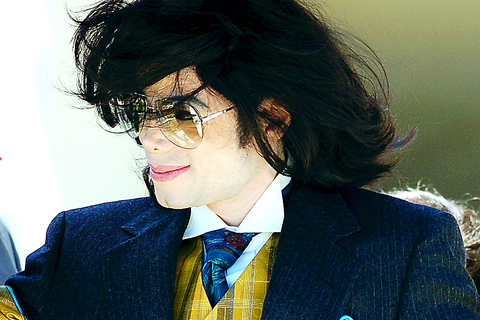Michael Jackson's prosecutors hoped for explosive 11th-hour testimony yesterday as they prepared to rest their child-sex case against the "King of Pop."
Having portrayed Jackson as a "sociopath" who used booze and porn to lure young boys into bed, the prosecution is now struggling to convince jurors the 46-year-old superstar had also plotted to kidnap his young accuser.
Legal analysts believe the conspiracy claims are the weakest of the 10 charges against Jackson but say the prosecution evidently hoped a key witness was to tie the loose ends together yesterday.

PHOTO: AP
"It's the ultimate cliff-hanger," said legal expert Jim Moret. It is crucial for the prosecutors to end on a strong note, he said.
The prosecution could rest its case as early as Wednesday, and Judge Rodney Melville has said he did not anticipate a break in the trial before the defense team starts bringing in its witnesses.
Court-watchers believe lead defense attorney Thomas Mesereau will first seek a mistrial or at least an acquittal on the conspiracy charges.

PHOTO: AP
John Duross O'Bryan testified that Jackson's finances had deteriorated into a full-blown cash crisis by February 2003, when the broadcast of a damaging documentary threatened to completely derail his faltering career.
His overall debt had risen to around US$224 million -- from US$155 million in 2000 -- and included US$10.5 million in unpaid vendor invoices.
Earlier Tuesday, police Sergeant Steve Robel told jurors how Jackson's ex-wife, Debbie Rowe, had described the singer as a "sociopath" and admitted they had a "plan" to always put a positive spin on their relationship.

PHOTO: AP
Leaked legal documents show that when they divorced, Rowe pledged -- in return for a multimillion-dollar settlement -- never to talk about Jackson's purported drug use, "sexual behavior" and whether or how he fathered their children Prince Michael and Paris.
Jackson, 46, has denied the charges against him. He faces up to 20 years behind bars if convicted on all 10 charges.
Chinese actor Li Ya-peng quashed months of frenzied media speculation yesterday by denying he is to marry Hong Kong pop diva Faye Wong.
Despite a stream of gossip in the Chinese and Hong Kong press, the couple has kept mum about their plans even to their closest friends and family.
But the actor was forced to break his silence after his mother confronted him on whether he had secretly married the Beijing-born, Hong Kong-based singer.
"If I have decided to get married, why wouldn't I tell my mother? ... I've yearned for a family and marriage since I was a child although this dream has yet to come true," he was quoted as saying by Hong Kong-based Phoenix Satellite TV.
Wong, who married and divorced Chinese singer Dou Wei, is one of the most highly regarded Chinese pop singers with hits throughout Asia in Cantonese and Mandarin.
She has been romantically linked to a string of stars, including bad-boy singer Nicholas Tse.
Frank Sinatra once served as a Mafia courier and narrowly escaped arrest with a briefcase containing US$3.5 million in cash, entertainer Jerry Lewis told authors of a new book excerpted on Tuesday in Vanity Fair magazine. The anecdote attributed to Lewis is one of several accounts linking the legendary singer to organized crime in the unauthorized biography Sinatra: The Life, by Anthony Summers and Robbyn Swan and due for release May 16 by Alfred Knopf.
Two vocalists who performed on rapper Lil Kim's La Bella Mafia album are suing the Grammy winning recording artist for breach of contract and demanding to be paid more than US$100,000 each. In a complaint filed on Monday in the New York State Supreme Court, Anthony Jeffries and Vincent Hart said the Lil Kim album sold more than 1 million copies and in lieu of an agreed cash payment, she gave each of them a piece of jewelry valued at around US$10,000.
Martha Stewart, trying to soften her post-prison image, pitched herself to prospective advertisers on Monday as a kinder and gentler TV host who can tell a joke as well bake the perfect pie crust. The lifestyle trendsetter said her new daily TV show, to be called Martha, will take a more populist approach than her prior TV ventures.

The canonical shot of an East Asian city is a night skyline studded with towering apartment and office buildings, bright with neon and plastic signage, a landscape of energy and modernity. Another classic image is the same city seen from above, in which identical apartment towers march across the city, spilling out over nearby geography, like stylized soldiers colonizing new territory in a board game. Densely populated dynamic conurbations of money, technological innovation and convenience, it is hard to see the cities of East Asia as what they truly are: necropolises. Why is this? The East Asian development model, with

June 16 to June 22 The following flyer appeared on the streets of Hsinchu on June 12, 1895: “Taipei has already fallen to the Japanese barbarians, who have brought great misery to our land and people. We heard that the Japanese occupiers will tax our gardens, our houses, our bodies, and even our chickens, dogs, cows and pigs. They wear their hair wild, carve their teeth, tattoo their foreheads, wear strange clothes and speak a strange language. How can we be ruled by such people?” Posted by civilian militia leader Wu Tang-hsing (吳湯興), it was a call to arms to retake

This is a deeply unsettling period in Taiwan. Uncertainties are everywhere while everyone waits for a small army of other shoes to drop on nearly every front. During challenging times, interesting political changes can happen, yet all three major political parties are beset with scandals, strife and self-inflicted wounds. As the ruling party, the Democratic Progressive Party (DPP) is held accountable for not only the challenges to the party, but also the nation. Taiwan is geopolitically and economically under threat. Domestically, the administration is under siege by the opposition-controlled legislature and growing discontent with what opponents characterize as arrogant, autocratic

When Lisa, 20, laces into her ultra-high heels for her shift at a strip club in Ukraine’s Kharkiv, she knows that aside from dancing, she will have to comfort traumatized soldiers. Since Russia’s 2022 invasion, exhausted troops are the main clientele of the Flash Dancers club in the center of the northeastern city, just 20 kilometers from Russian forces. For some customers, it provides an “escape” from the war, said Valerya Zavatska — a 25-year-old law graduate who runs the club with her mother, an ex-dancer. But many are not there just for the show. They “want to talk about what hurts,” she